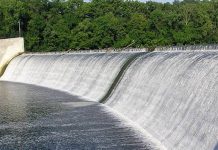IRSA Raises Alarming Concerns:
The Indus River System Authority (IRSA) has sounded the alarm regarding an impending water crisis anticipated in the canals during the upcoming summer season. The authority has identified several factors contributing to this crisis, with the Water and Power Development Authority (WAPDA) coming under scrutiny for alleged incompetence and mismanagement.
WAPDA Under Scrutiny:
IRSA has pointed fingers at WAPDA, citing issues such as diminished snowfall, rampant water theft, and delayed infrastructure projects as key factors exacerbating the looming water shortage. These concerns have raised fears that the deficit in water availability could skyrocket to as much as 40 per cent during the crucial summer months.
Infrastructure Project Delays:
During a recent briefing, sources from the meeting highlighted IRSA’s criticism of WAPDA’s failure to promptly complete expansion projects on Tarbela Dam. The delay in the construction of the T-5 project is of particular concern, and it is expected to withhold a significant volume of water—approximately 85 thousand cusecs. Furthermore, flaws in the design of the T4 project are projected to result in an additional 30,000 cusecs of water remaining undelivered, compounding the overall shortfall to a staggering 115,000 cusecs from Tarbela Dam alone.
Regional Impact:
Punjab, one of Pakistan’s key agricultural regions, is bracing for a significant water shortage, with estimates suggesting a deficit of 45,000 cusecs due to ongoing reconstruction work on Mangla Dam power units. This shortage could have profound implications for the region’s agricultural productivity and water-dependent activities.
Also Read: Water Crisis, Extensive Trouble of Pakistan – Causes, Effects & Solution
Escalating Water Theft and Distribution Discrepancies:
IRSA’s concerns extend beyond infrastructure delays, as the authority highlights the persistent issue of water theft, estimated at 15 per cent from canals, barrages, and rivers. Additionally, during the current Kharif season, an alarming ten million cusecs of water are expected to be lost to the sea, further exacerbating the scarcity. Moreover, discrepancies in reported figures regarding water distribution among provinces have been revealed, adding complexity to an already dire situation.
Conclusion:
In conclusion, IRSA’s warnings of an impending water crisis underscore the urgent need for coordinated action and effective management strategies to mitigate the potentially devastating impacts on Pakistan’s agriculture, livelihoods, and overall socio-economic stability.
How useful was this article?
Please rate this article
Average rating / 5. Vote count:













































